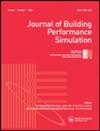利用共享建筑集群数据集的基于lstm的增强社区能耗预测模型
IF 2.3
4区 工程技术
Q2 CONSTRUCTION & BUILDING TECHNOLOGY
引用次数: 0
摘要
与过去不同的是,随着建筑规模从单个建筑扩展到建筑群,需要满足整个社区的能耗需求。本研究试图通过反映单个建筑共享用电量数据中嵌入的固有居住者行为模式来提高单个建筑的用电量预测性能。该方法利用其他7栋目标建筑的用电量数据作为LSTM模型输入的一部分,并结合气象数据预测特定建筑的用电量分布。结果表明,该方法利用周边建筑相似的能耗分布减少了误差*,基于RMSE的社区总用电量预测性能提高了5.11%。新提出的方法反映了固有的居住者行为模式和附近建筑物能源概况的时间电力消耗模式。本文章由计算机程序翻译,如有差异,请以英文原文为准。
Enhanced LSTM-based community energy consumption prediction model leveraging shared building cluster datasets
Unlike in the past, as the scale of buildings expands from a single building to a group of buildings, it is necessary to respond to the demand for energy consumption for the entire community. This study attempted to improve the electricity consumption prediction performance of single buildings by reflecting the inherent occupant behaviour patterns embedded in the shared electricity consumption data of single buildings. The proposed method utilized electricity consumption data for all other 7 target buildings as a part of LSTM model inputs in combination with meteorological data to predict the electricity consumption profile of a specific building. As a result, the proposed method reduced the error by utilizing the similar energy profiles of the surrounding buildings, *and the prediction performance of the total electricity consumption of the community was increased by 5.11% based on RMSE. The newly proposed method reflects the inherent occupant behaviour patterns and temporal electricity consumption patterns from energy profiles of nearby buildings.
求助全文
通过发布文献求助,成功后即可免费获取论文全文。
去求助
来源期刊

Journal of Building Performance Simulation
CONSTRUCTION & BUILDING TECHNOLOGY-
CiteScore
5.50
自引率
12.00%
发文量
55
审稿时长
12 months
期刊介绍:
The Journal of Building Performance Simulation (JBPS) aims to make a substantial and lasting contribution to the international building community by supporting our authors and the high-quality, original research they submit. The journal also offers a forum for original review papers and researched case studies
We welcome building performance simulation contributions that explore the following topics related to buildings and communities:
-Theoretical aspects related to modelling and simulating the physical processes (thermal, air flow, moisture, lighting, acoustics).
-Theoretical aspects related to modelling and simulating conventional and innovative energy conversion, storage, distribution, and control systems.
-Theoretical aspects related to occupants, weather data, and other boundary conditions.
-Methods and algorithms for optimizing the performance of buildings and communities and the systems which service them, including interaction with the electrical grid.
-Uncertainty, sensitivity analysis, and calibration.
-Methods and algorithms for validating models and for verifying solution methods and tools.
-Development and validation of controls-oriented models that are appropriate for model predictive control and/or automated fault detection and diagnostics.
-Techniques for educating and training tool users.
-Software development techniques and interoperability issues with direct applicability to building performance simulation.
-Case studies involving the application of building performance simulation for any stage of the design, construction, commissioning, operation, or management of buildings and the systems which service them are welcomed if they include validation or aspects that make a novel contribution to the knowledge base.
 求助内容:
求助内容: 应助结果提醒方式:
应助结果提醒方式:


